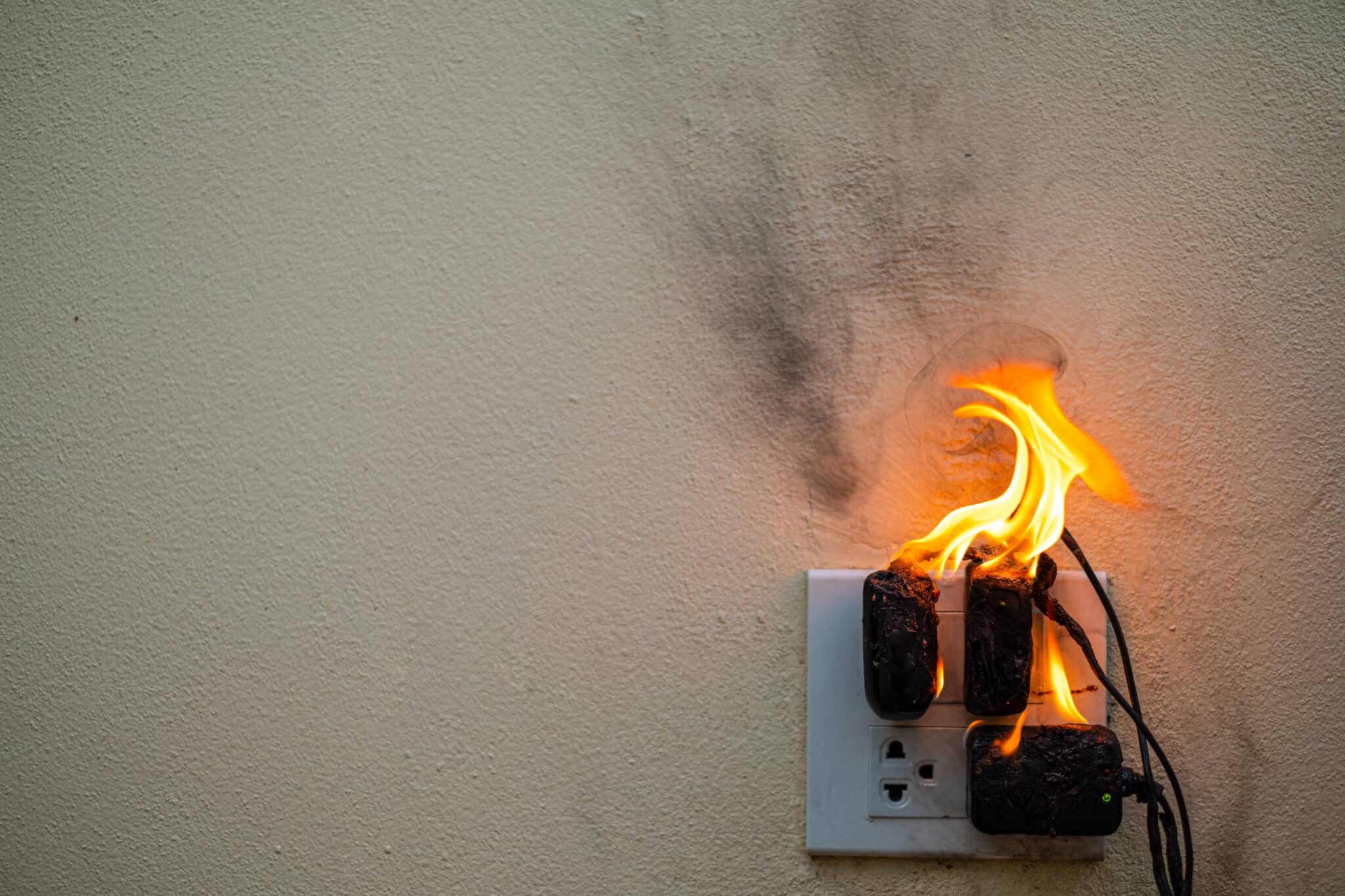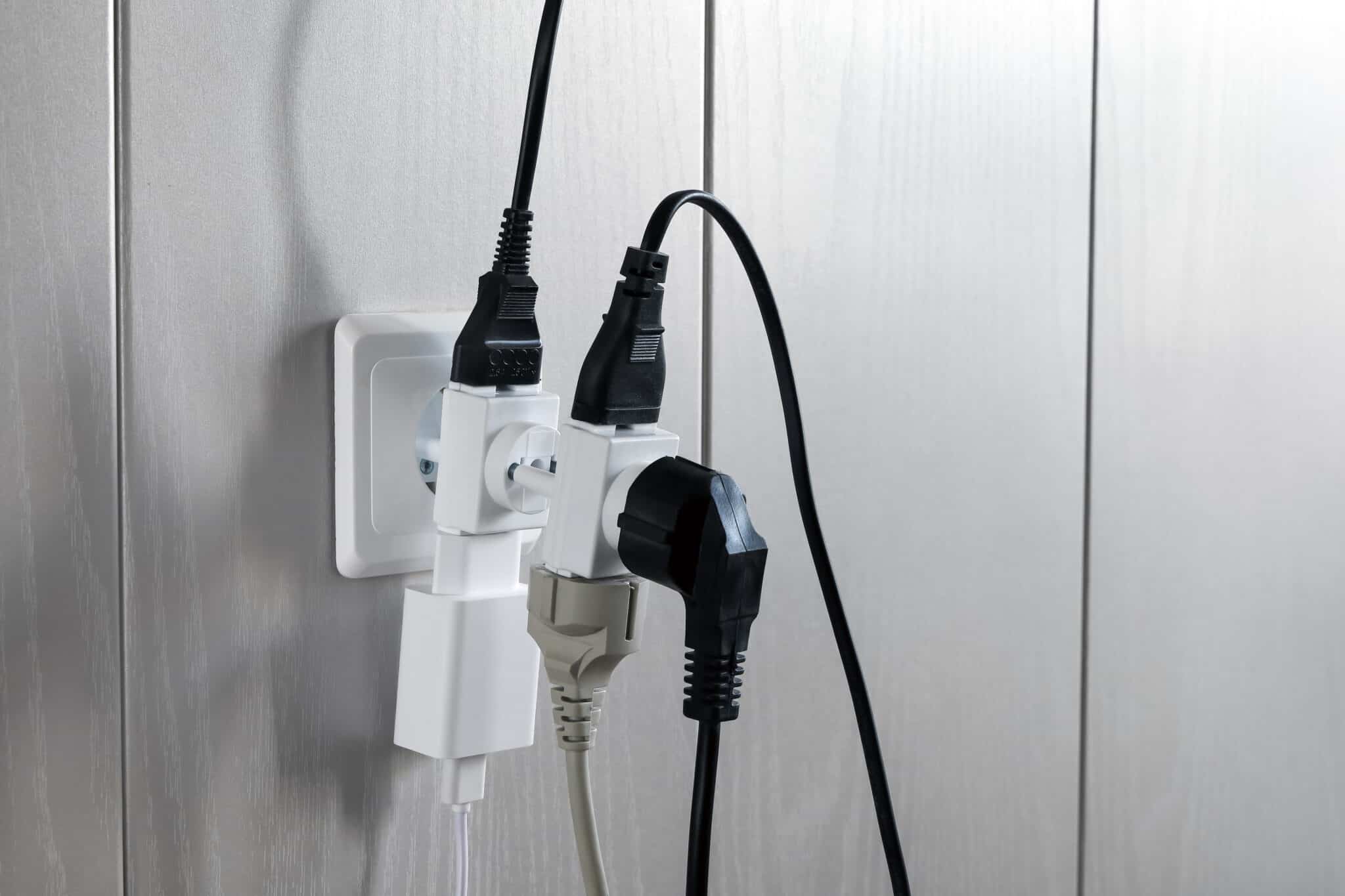Electrical Overloads – Have you ever noticed your lights flickering or heard a strange buzzing sound when you plug in an appliance? These could be signs of electrical overload.
Understanding what causes these overloads and how to prevent them can help you keep your home safe. In this blog, we’ll explore the ins and outs of electrical overloads, their causes, and practical steps you can take to prevent them.
What is an Electrical Overload?
Electrical overloads occur when too much current flows through the electrical wiring, exceeding its capacity.
This can happen when too many appliances are plugged into the same circuit or when an appliance draws more power than the circuit can handle.
When this happens, the circuit breaker trips, cutting off the power to prevent damage or fire.

Why Do Electrical Overloads Happen?
Too Many Appliances on One Circuit
Plugging too many devices into a single outlet or circuit can easily cause electrical overload. For example, running your microwave, toaster, and coffee maker all at once on the same circuit can trip the breaker. This happens because the total power demand exceeds what the circuit can safely handle.
Faulty Wiring
Older homes with outdated wiring may not be able to handle the electrical demands of modern appliances. Faulty wiring can also increase the risk of overload. Over time, wiring can degrade or become damaged, further reducing its capacity to safely conduct electricity.
High-Power Appliances
Some appliances, like air conditioners or space heaters, draw a lot of power. If these are used on circuits not designed to handle their load, it can cause an overload. These appliances often require dedicated circuits to prevent overwhelming your home’s electrical system.
Extension Cords and Power Strips
Using multiple extension cords or power strips can lead to an overload, especially if they’re connected to high-power appliances. Overloading extension cords and power strips can create hazardous conditions, including overheating and potential fire risks.
Signs of an Electrical Overload
Recognizing the signs of an electrical overload can help you address issues before they become serious problems. Here are some key indicators that your electrical system may be overloaded:
Dimming or Flickering Lights
One of the first signs of an overload is dimming or flickering lights. If your lights dim or flicker when you turn on an appliance, it’s a clear indication that your circuit is struggling to handle the load.
This problem should not be ignored, as it can escalate to more serious electrical issues.
Warm or Hot Electrical Outlets
Warm or hot electrical outlets are another warning sign. Outlets should never be hot to the touch.
If they are, it means they’re overworked, which can be dangerous and potentially lead to fires. Regularly check your outlets for unusual heat to catch issues before they become hazardous.
Frequent Tripping of Circuit Breakers
If your circuit breakers trip frequently, it’s a strong indication that your electrical system is overloaded. Circuit breakers are designed to cut off power to prevent overheating, so frequent tripping means your circuits are constantly being pushed beyond their capacity.

Risks Associated with Electrical Overloads
Electrical overloads can lead to serious risks, making it essential to address them promptly. Here are some of the potential dangers:
Potential Fire Hazards
One of the most significant risks of electrical overloads is fire hazards. Overloaded circuits can overheat, melting the insulation around wires and potentially causing a fire. Ensuring your circuits are not overloaded is crucial for fire prevention.
Damage to Electrical Appliances
Electrical overloads can also damage your appliances. Excessive current can cause appliances to overheat, shortening their lifespan or even rendering them inoperable. Protecting your appliances from overloads can save you money and hassle in the long run.
Increased Risk of Electrical Shocks
Another serious risk is the increased chance of electrical shocks. Overloaded circuits can cause electrical components to deteriorate, leading to exposed wires and other hazards that can result in electric shocks.
Preventing Electrical Overloads
Preventing electrical overloads involves understanding your home’s electrical system and taking steps to ensure it can handle your needs. Here are some practical tips to prevent overloads:
Know Your Circuits
One of the best ways to prevent electrical overloads is to know your home’s electrical circuits. Each circuit in your home is designed to handle a certain amount of power. Here’s what you can do:
- Map Your Circuits: Create a map of your home’s electrical circuits. Label each circuit breaker in your panel with the rooms and outlets it controls.
- Check Circuit Capacity: Ensure each circuit’s load does not exceed its capacity. A standard circuit can typically handle up to 15 or 20 amps.
Spread Out Your Appliances
Avoid plugging too many high-power appliances into a single circuit. Instead, spread them out across different circuits. For example, if you have multiple high-power appliances in your kitchen, make sure they’re on separate circuits.
Upgrade Your Wiring
If you live in an older home, consider upgrading your wiring. Modern appliances and electronics require more power than older wiring systems can handle. Upgrading your wiring can help prevent overloads and improve the safety of your home.
Use Surge Protectors
Surge protectors can help prevent overload by managing the flow of electricity to your devices. They can also protect your electronics from power surges.
Avoid Overusing Extension Cords
Extension cords should only be used as a temporary solution. If you find yourself relying on them regularly, it might be time to add more outlets or upgrade your electrical system.
Using Appliances Wisely
Use appliances wisely by:
- Turning off unused devices: Don’t leave appliances running when not in use.
- Staggering usage: Avoid running multiple high-wattage appliances simultaneously.
- Regular maintenance: Keep appliances in good working order to ensure they operate efficiently.
What to Do If You Experience an Electrical Overload
If you experience an electrical overload, it’s crucial to take immediate action to prevent damage or fire. Here are the steps you should follow:
- Unplug Devices: Begin by unplugging all devices on the affected circuit. This will help reduce the load and prevent further issues. Removing the excess load can often resolve the problem temporarily and make it safer to address the issue.
- Reset the Breaker: Go to your electrical panel and reset the tripped breaker. This can be done by switching it off completely and then turning it back on. If the breaker trips again immediately or shortly after, there might be a more serious problem that requires professional attention.
- Check for Damage: Inspect your outlets, switches, and appliances for signs of damage, such as burn marks, melted plastic, or a burning smell. These are clear indicators that the overload may have caused more severe problems. If you find any damage, do not use the affected outlets or appliances.
- Call a Professional: If you’re unable to identify the cause of the overload or if the problem persists after resetting the breaker, contact a licensed electrician for assistance. Professional electricians can diagnose and fix the underlying issues, ensuring your electrical system is safe and reliable.
Taking these steps promptly can prevent further damage and ensure the safety of your home and its occupants.
The Importance of Professional Help
While some electrical issues can be handled by homeowners, others require the expertise of a licensed electrician. Here are a few reasons why it’s important to seek professional help:
Safety: Electricity is dangerous, and attempting to fix electrical issues without the proper knowledge and tools can result in serious injury or even death. A licensed electrician has the training and experience to safely handle electrical problems.
Code Compliance: Electrical work must comply with local building codes to ensure safety and reliability. Licensed electricians are familiar with these codes and can ensure that your electrical system meets all requirements.
Long-Term Savings: While hiring a professional might seem expensive upfront, it can save you money in the long run. Properly installed and maintained electrical systems are less likely to experience problems, reducing the need for costly repairs.
Upgrading Your Electrical System
If your home’s electrical system is outdated, consider upgrading it to ensure safety and efficiency. Here’s how to assess and proceed:
Assessing the Need for an Upgrade
Signs that your system needs an upgrade include:
- Frequent breaker trips
- Flickering lights
- Hot outlets or switches
- Reliance on extension cords and power strips for permanent solutions
If you notice any of these issues, it’s time to evaluate your electrical system’s capacity and safety.
Hiring a Professional Electrician
Hiring a professional electrician is crucial for a safe and effective upgrade. Look for a licensed, experienced electrician who can assess your current system, recommend necessary upgrades, and perform the work safely.
A professional will ensure that all work complies with local building codes and safety standards, providing peace of mind and long-term reliability.
Benefits of Modern Electrical Panels
Upgrading to modern electrical panels offers several benefits, including:
- Increased capacity: Handle more appliances and devices without overloads, supporting your household’s growing electrical demands.
- Enhanced safety: Modern panels have improved safety features, reducing the risk of electrical fires and other hazards.
- Energy efficiency: More efficient use of electricity, which can reduce your energy costs and improve the overall performance of your electrical system.
Upgrading your electrical system is a proactive step towards maintaining a safe and efficient home environment.
Using Protective Devices
Protective devices can help safeguard your electrical system from overloads and other issues. Here are some options:
Surge Protectors and UPS Systems
Surge protectors and Uninterruptible Power Supplies (UPS) protect your devices from power surges and interruptions. Surge protectors absorb excess voltage, while UPS systems provide backup power during outages.
Types of Circuit Breakers and Their Uses
Different types of circuit breakers offer various levels of protection:
- Standard circuit breakers: Protect against overloads and short circuits.
- Ground Fault Circuit Interrupters (GFCIs): Protect against ground faults and reduce the risk of electric shock.
- Arc Fault Circuit Interrupters (AFCIs): Protect against arc faults, which can cause fires.
Installing GFCI and AFCI Outlets
Installing GFCI and AFCI outlets in your home can significantly enhance safety. GFCIs are particularly useful in wet areas like bathrooms and kitchens, while AFCIs are ideal for preventing fires in living spaces and bedrooms.
Regular Maintenance and Inspections
Regular maintenance and inspections are essential for a safe and reliable electrical system. Here’s what to do:
Routine Electrical System Check-Ups
Perform routine check-ups to identify and address issues early. This includes:
- Inspecting wiring: Look for signs of wear or damage.
- Testing outlets and switches: Ensure they work properly and are not hot to the touch.
- Checking circuit breakers: Test breakers to ensure they trip correctly.
Identifying and Fixing Potential Issues
During inspections, identify potential issues such as:
- Frayed wires: Replace damaged wiring.
- Loose connections: Tighten connections to prevent overheating.
- Corroded components: Replace corroded parts to maintain efficiency and safety.
Scheduling Professional Inspections
While DIY maintenance is important, professional inspections are crucial. Schedule regular inspections with a licensed electrician to ensure your system meets current safety standards and operates efficiently.
Ready to Safeguard Your Home from Electrical Overloads?
At Mister Sparky of Charleston, we specialize in protecting your home from electrical overloads.
Serving Mt. Pleasant and Summerville, our licensed electricians provide expert diagnostics, repairs, and upgrades to ensure your electrical system operates safely and efficiently.
Don’t wait for an emergency to take action—call us today at 843-588-1912 to schedule an inspection or service appointment.
With our commitment to quality and safety, you can trust us to keep your home’s electrical system in top condition.
Contact us now and experience the peace of mind that comes with professional electrical services.
FAQs on Electrical Overloads
What should I do if my circuit breaker trips frequently?
If your circuit breaker trips frequently, it’s essential to identify the cause. Start by unplugging all devices on the circuit and then plugging them in one at a time to see which one causes the trip. If the issue persists, consult a professional electrician to inspect your wiring and circuit capacity.
Can an electrical overload damage my appliances?
Yes, an electrical overload can damage your appliances. Excessive current can cause appliances to overheat, potentially leading to permanent damage. Using surge protectors and ensuring your circuits are not overloaded can help protect your appliances.
How do I know if my home needs an electrical upgrade?
Signs that your home may need an electrical upgrade include frequent breaker trips, flickering lights, hot outlets or switches, and reliance on extension cords and power strips for permanent solutions. If you notice any of these signs, consult a professional electrician to assess your system.
What is the difference between a surge protector and a circuit breaker?
A surge protector guards your appliances against sudden spikes in voltage, while a circuit breaker protects your electrical system from overloads and short circuits by cutting off power when necessary. Both devices are essential for maintaining a safe and reliable electrical system.
Are GFCI and AFCI outlets necessary in every home?
GFCI and AFCI outlets are highly recommended for every home. GFCIs are crucial for preventing electric shocks, especially in wet areas like bathrooms and kitchens. AFCIs protect against arc faults, which can cause fires, making them essential for living spaces and bedrooms.
How can I prevent an electrical overload in my home?
Preventing an electrical overload involves not overloading circuits with too many appliances, ensuring proper wiring, using surge protectors, and having regular electrical inspections. Spread out high-power appliances across different circuits and avoid using multiple extension cords or power strips.
Can electrical overloads occur in modern homes?
Yes, electrical overloads can occur in modern homes, especially if too many high-power devices are used simultaneously on the same circuit. Even modern homes need to follow proper electrical usage guidelines to avoid overloads.
What should I do if I suspect an electrical overload but my breaker hasn’t tripped?
If you suspect an electrical overload but your breaker hasn’t tripped, immediately unplug some devices from the suspected circuit. Check for signs like warm outlets or flickering lights. It’s best to consult a licensed electrician to inspect your system and ensure it’s functioning safely.
Are electrical overloads more common in certain areas of the home?
Yes, electrical overloads are more common in areas where high-power appliances are frequently used, such as kitchens, bathrooms, and home offices. These areas often require dedicated circuits to handle the load safely.
How often should I have my electrical system inspected to prevent electrical overload?
It is recommended to have your electrical system inspected by a licensed electrician at least once every 3 to 5 years. If you live in an older home or frequently experience electrical issues, more frequent inspections may be necessary to prevent electrical overloads.






